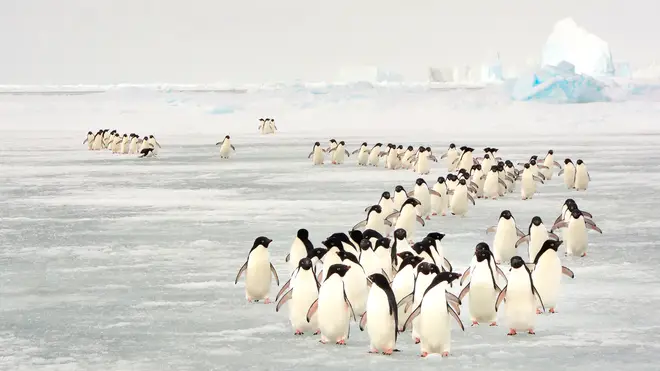Five glorious pieces of classical music inspired by Antarctica
3 April 2023, 00:00

 Promoted by Hurtigruten Expeditions
Promoted by Hurtigruten Expeditions
From symphonies portraying the icy landscapes, to otherworldly documentary soundtracks exploring its oceans, these are just some of the unexpected works of classical music inspired by the fantastical frozen continent...
The stunning scenery of Antarctica, the world’s most southern continent, has long inspired artists, dancers and musicians alike.
Despite 98 percent of the terrain being made up of ice and snow, the frozen continent has one of the planet’s most diverse and varied landscapes, from towering mountains and volcanos to ice caves and fragile glaciers.
Taken with this dramatic and otherworldly environment, famed classical composers such as Ralph Vaughan-Williams, Howard Goodall, and Peter Maxwell-Davies have written their own love letters in the form of music to the frozen landmass.
Listen to their, and many others’, musical interpretations of the frozen continent below.

Penguins at the National Sea Life Centre get a Valentine's Day treat
-
Shackleton’s Cross – Howard Goodall
This peaceful work for solo piano is Goodall at his finest. A no-frills melodic tune whose soundworld immediately transports you to the still polar desert of the south.
The evocative use of the upper registers on the keyboard brings to mind the delicate and fragile nature of ice, and the stillness that must surround this frozen wonder of nature, or else it shatter.
Sir Edward Shackleton was one of the major figures during what was termed the Heroic Age of Antarctic Exploration at the start of the 20th century. The Anglo-Irish explorer led three British expeditions to the Antarctic, and the title of Goodall’s 2012 piece refers to the stone cross that stands in memorial to Shackleton, stationed on an island 2,000km north of the continent.

Goodall: Shackleton's Cross
-
Sinfonia Antarctica – Ralph Vaughan Williams
Originally written as the soundtrack for the 1948 epic film Scott of the Antarctic, the film theme composed by English composer Ralph Vaughan-Williams later became the basis of his five-movement-long seventh symphony written in 1953, Sinfonia Antarctica.
At the start of each movement, a literary verse is inscribed at the top of the score, alluding to the text Vaughan-Williams took inspiration from when writing the music, as the composer never actually visited the continent.
The fifth and final movement, opening with a heavy march-like motif, is inscribed with a line from Captain Scott’s last journal. Scott, on whom the film in question is based, was a British naval officer who led two expeditions to Antarctica in the early 20th century.
The quote from his journal reads, “I do not regret this journey; we took risks, we knew we took them, things have come out against us, therefore we have no cause for complaint.”

Sinfonia Antartica (Symphony No. 7) : V. Epilogue - Alla marcia, moderato
-
Symphony No. 8 (Antarctic Symphony) – Peter Maxwell-Davies
The late Peter Maxwell-Davies travelled to Antarctica for three weeks, after being commissioned by the British Antarctic Survey to write music in celebration of the 50th anniversary of Vaughan-Williams’ score, Scott of the Antarctic.
The British composer’s eighth symphony premiered in May 2001, 48 years after Vaughan-Williams’ own seventh symphony. Unlike the elder composer’s piece, Maxwell-Davies’ orchestral work was written as just one 40-minute movement.
In his programme notes for the work, Maxwell-Davies wrote that he was inspired by the stillness of the water, as he was travelling on a scientific vessel which made remarkably little noise, allowing the composer to appreciate the tranquillity of the environment.
Then, came the breaking of the ice as the ship ‘rammed her way’ through the hard frozen sea. The composer wrote, “The ice crashing along the bows was one of the most exhilarating sounds I ever heard, with electric zippings and cracklings sounding off into the far distance as fissures extended for miles from the ship.”

Peter Maxwell Davies - Symphony No.8 'Antarctic' (2000)
-
Antarctica Suite for Guitar and Orchestra – Nigel Westlake
Australian composer Nigel Westlake takes a leaf out of Vaughan-Williams’ book as his Antarctica Suite was also originally a film score.
Westlake, who wrote the music for the Babe and Babe: Pig in the city films, wrote the score to the 1991 IMAX documentary film, Antarctica.
He then took this music and transformed it into a four-movement orchestral suite for Guitar and Orchestra, which was commissioned by the Australian broadcast network ABC for their 60th anniversary year in 1992.
Listen to the suite’s magical third movement, ‘Penguin Ballet’ performed by acclaimed guitarist John Williams and the London Symphony Orchestra below.

Antarctica (Suite for Guitar and Orchestra) : Penguin Ballet
-
March of the Penguins – Alex Wurman
Voiced by the distinctively deep voice of Morgan Freeman, March of the Penguins was a documentary about the southern continent bird released in 2005 by the National Geographic Society.
The composer of the English version of the documentary was Emmy Award-winning American composer Alex Wurman, whose background in both classical and jazz music can be detected throughout his acclaimed score.
With each track, Wurman manages to weave between depicting the beautiful and delicate frozen landscape, as well as communicating the harsh realities and dangers the windy continent presents.

The Harshest Place on Earth










































